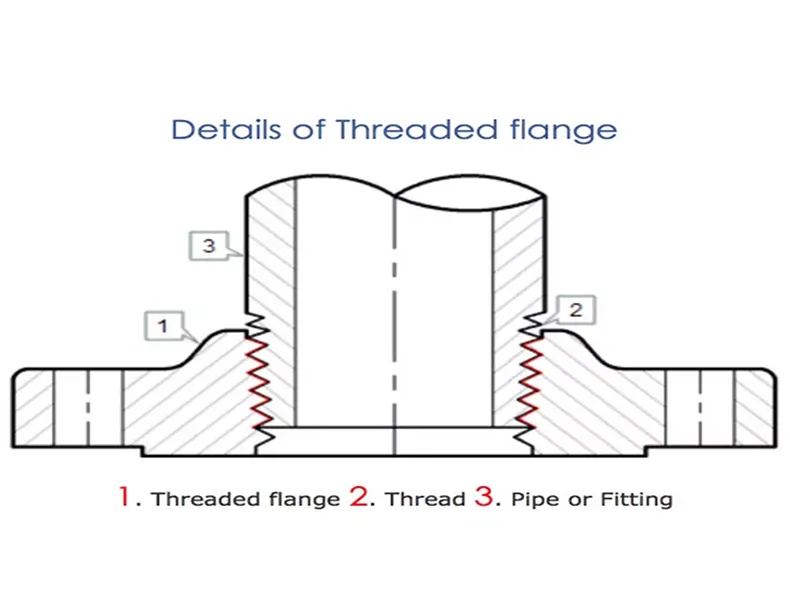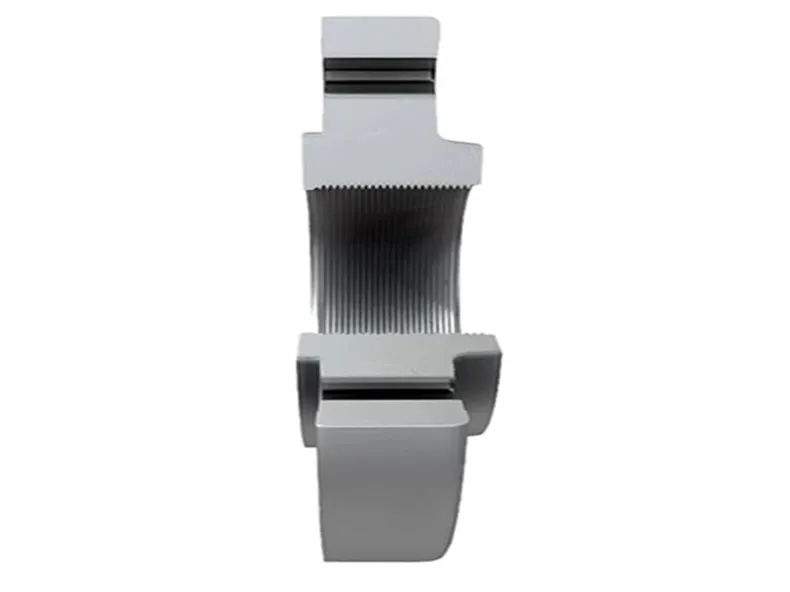Threaded Flange
A threaded flange, also known as a screwed flange, a flange that is designed for connecting pipes using screw threads, providing a strong, leak-proof seal without the need for welding. Typically used in low-pressure and non-cyclic applications, threaded flanges are ideal for situations where welding is hazardous or impractical, such as in flammable environments. They are often fabricated from materials such as stainless steel, carbon steel, and alloy steel, offering versatility and durability. If you are interested in our threaded flanges, please contact us.
REFINE BY
- Flange Manufacturer
- Flange standard
- Welding Neck Flange
- Stainless steel Flange
- Carbon & Alloy steel Flange
- Blind Flange
- Lap Joint Flange
- Orifice Flange
- Threaded Flange
- Swivel Ring Flange
- Reducing Flange
- Slip-On Flange
- Spectacle Blind Flange
- Compact Flange
- 1/2" (24)
- 3/4" (24)
- 1" (24)
- 1-1/4" (24)
- 1-1/2" (24)
- 2" (25)
- 2-1/2" (24)
- 3" (24)
- 4" (20)
- 4" (20)
- 304L (179)
- 316L (179)
Threaded Flanges Models

Design And Structure Of Thread Flange
The main body of the flange is typically a circular metal plate with a central hole. The plate can have different types of faces, such as flat face (FF), raised face (RF), or ring-type joint (RTJ), depending on the sealing requirements.
The central hole of the flange is threaded to match the external threads of the pipe it connects to. The threads can be of various types, such as National Pipe Thread (NPT), British Standard Pipe (BSP), or other standard thread types, ensuring a secure and leak-proof connection.
Around the circumference of the flange body are evenly spaced bolt holes. These holes allow the flange to be bolted to another flange or a fitting, providing mechanical strength to the connection.
In raised-face threaded flanges, the central portion around the bore is slightly raised above the bolt circle face. This design provides a better sealing surface when used with gaskets, enhancing the leak-proof nature of the connection.
The face finish of the flange, particularly the raised face, is often machined to a specific roughness to ensure optimal gasket seating. Common finishes include a concentric or spiral serrated finish, which helps in creating a tight seal.

Flange With Thread Material
Flanges with threaded materials are designed to connect pipes and components using screw threads, eliminating the need for welding. These flanges are made from a variety of materials, each suited to different operational environments and pressures. Typical materials include stainless steel, valued for its ability to resist corrosion and its strength; carbon steel, valued for its toughness and cost-effectiveness; and alloy steel, which excels in high-temperature and high-pressure settings. The choice of material ensures the flange’s durability and compatibility with the specific conditions of the piping system.
All Thread Flange Advantages
Threaded flanges are simple to install, requiring only the proper threading technique and tools. This eliminates the need for welding, making the process faster and more straightforward.
Since threaded flanges do not require welding, they are ideal for applications where welding is impractical or hazardous, such as in flammable environments.
The installation and maintenance of threaded flanges are generally less expensive compared to welded flanges, as they do not require specialized welding equipment or highly skilled labor.
Threaded flanges can be easily disassembled and reassembled, which is beneficial for maintenance, inspections, or modifications. This makes them suitable for systems that require frequent changes or repairs.
The threaded connection provides a strong, secure fit that is less likely to loosen under conditions of vibration or movement, enhancing the reliability of the piping system.
Threaded flanges can be used with a variety of pipe materials and in a range of applications, from low-pressure residential plumbing to certain industrial processes, depending on the thread and flange material.

Threaded Flange Connection
- Verify that the external threads on the pipe or fitting match the internal threads of the threaded flange. This ensures proper engagement and alignment during assembly;
- Apply an appropriate sealing material to the threads. Common options include thread sealant compounds (e.g., Teflon tape) or thread sealant pastes. Ensure the sealant is compatible with the materials being connected and suitable for the operating conditions (e.g., pressure, temperature);
- Align the threaded end of the pipe or fitting with the threaded bore of the flange. Start threading the pipe or fitting into the flange by hand to prevent cross-threading;
- Use hand tools to continue threading the pipe or fitting into the flange until the threads are fully engaged. This initial tightening ensures that the components are properly seated and aligned;
- Once the threads are fully engaged, use appropriate tools (such as pipe wrenches or spanners) to further tighten the connection. Apply gradual and even pressure to achieve the recommended torque specification for the size and material of the components. Avoid over-tightening, which could damage the threads or distort the flange;
- After tightening, inspect the joint to ensure that the sealing material is properly compressed and that there are no gaps or leaks. This stage is essential for preserving the integrity of the connection and preventing fluid or gas leakage;
- Conduct a pressure test, if applicable, to verify the integrity of the threaded flange connection under operating conditions. This test helps ensure that the joint can withstand the specified pressure without leaking.
Threaded Flange Plate Standards And Specifications
ASME B16.5
This standard covers dimensions, tolerances, materials, marking, and testing criteria for pipe flanges and fittings in sizes NPS 1/2 through NPS 24. It includes threaded flanges as one of the types within its scope.
ASTM A105
This specification pertains to forged carbon steel piping components intended for use in pressure systems at ambient and elevated temperatures. ASTM A105 includes requirements for flanges, including threaded flanges, made from carbon steel.
ASTM A182
This specification encompasses forged or rolled alloy and stainless steel pipe flanges, forged fittings, valves, and components designed for use in high-temperature applications. ASTM A182 includes various grades suitable for threaded flange applications.
API 6A
This specification covers wellhead and Christmas tree equipment, including threaded flanges used in oil and gas production. It provides requirements for materials, dimensions, pressure ratings, and testing of threaded connections.
BS 10
This British Standard covers specifications for flanges and bolting for pipes, valves, and fittings. It includes dimensions, face types, materials, and pressure ratings for various types of flanges, including threaded types.
EN 1092
This European standard specifies requirements for circular steel flanges with a range of pipe connections, including threaded connections. It covers dimensions, materials, face types, pressure ratings, and marking requirements.
Threaded Flange Manufacturer
Elite Piping Manufacture Co., Ltd. specializes in the production of threaded flanges, offering a range of high-quality products tailored to meet diverse industrial and commercial piping needs. With a commitment to precision engineering and stringent quality control, Elite Piping manufactures threaded flanges according to international standards such as ANSI/ASME, API, and ASTM. Our threaded flanges are crafted from a variety of materials including stainless steel, carbon steel, alloy steel, and others, ensuring durability, corrosion resistance, and suitability for different operating conditions.
Elite Piping’s threaded flanges are designed for easy installation, reliability, and optimal performance in applications where welding is impractical or not preferred. The company’s reputation is built on delivering products that adhere to rigorous standards, making us a trusted choice for industries including oil and gas, petrochemical, power generation, and more.
GET IN TOUCH
Company:
Elite Piping Manufacture Co., Ltd.
Factory Address:
Office # 805, Building No. 6 Poly Metropolitan, Yongshum Town, Tongzhou District, Beijing, China.
Contact Person:
Michael
Contact Numbers:
+86 186 1829 1381
Email:
elite@elitepiping.com







